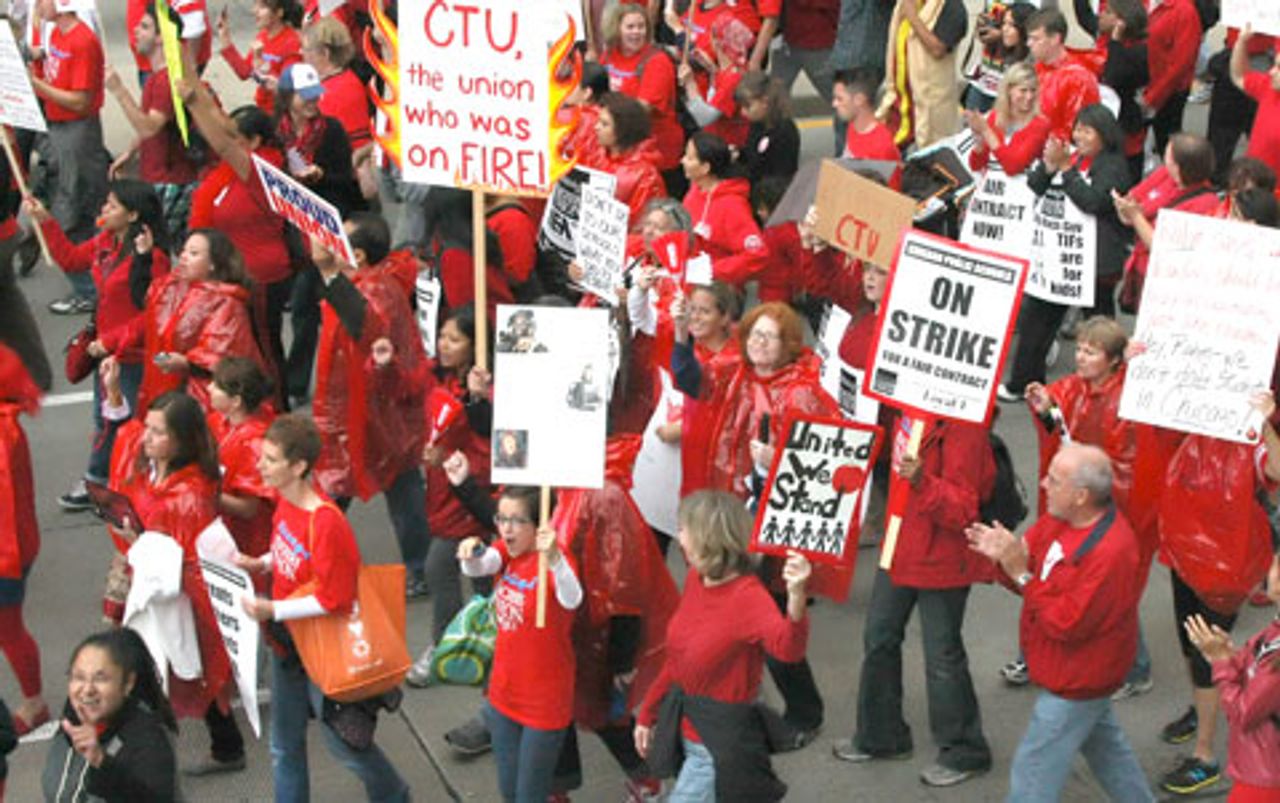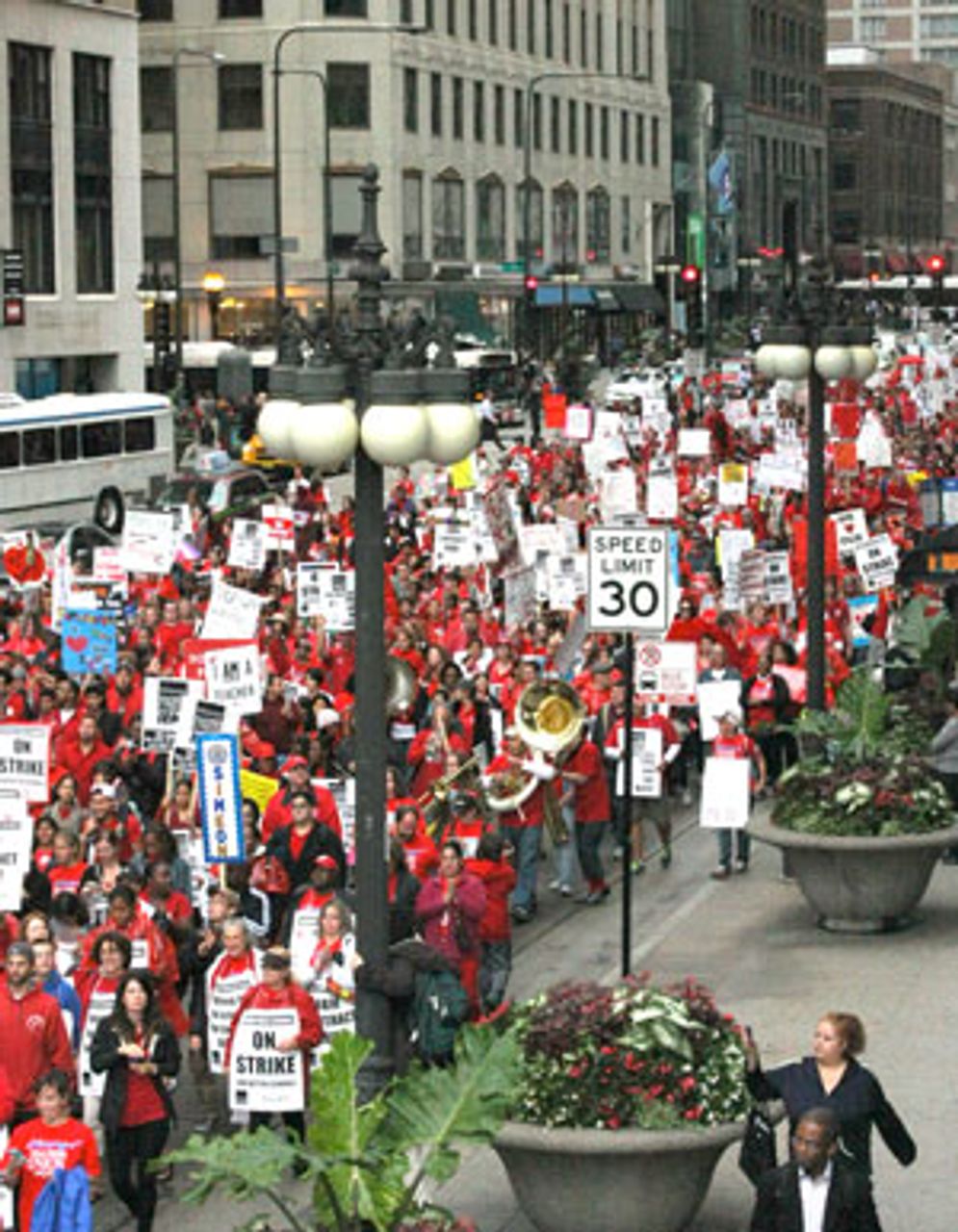 Striking teachers on the march
Striking teachers on the marchChicago Teachers Union (CTU) officials said on Thursday that they are moving quickly to wrap up negotiations with the Chicago Public Schools (CPS) and end a strike by 26,000 teachers.
After only five days, the CTU is seeking to demobilize teachers, under conditions in which they have won widespread support for their efforts to oppose the attack on public education. Any agreement on this basis can be nothing but a betrayal entirely along the lines of the demands of the CPS and Chicago Mayor Rahm Emanuel.
Emanuel’s attack is not the policy simply of one individual or administration. It is part of a coordinated assault on public education, supported by both big business parties and spearheaded by the Obama administration. Chicago is at the front lines of the effort by the ruling class to privatize education through the promotion of charter schools, while victimizing teachers.
 Teachers marching through downtown Chicago
Teachers marching through downtown ChicagoThe city administration is pushing for changes to teacher evaluation systems and rehiring policies that would effectively end job security. This is a prelude to the elimination of tens of thousands of public school teacher jobs. On Wednesday morning, the Chicago Tribune reported that the Emanuel administration had plans to shut down as many as 120 public schools over the next five years, but is waiting until after the strike ends to announce its proposals. The city will also expand the number of charter schools from 100 to 160.
There is no way that issues of this magnitude can be settled within a few days, or that Emanuel and his backers would retreat so quickly on any of their central demands. The administration, with the help of the CTU, is simply buying time and getting teachers back to work. This will make it extremely difficult for teachers to resume the strike once they learn the details of the sellout deal.
An end to the strike will be decided not by the teachers, but by a meeting of union delegates on Friday, when full details of the agreement may not even be available. Teachers will vote on the deal only after a return to work.
The ruthless determination of the ruling class, represented by both the Democrats and Republicans, was expressed in an editorial Thursday morning in the Chicago Tribune under the headline “Chicago Teacher Union fighting inevitability of education reform.”
Chicago teachers “are denying the arc of history,” the Tribune wrote. “Those vital reforms—evaluations tied to student growth and empowering principals to hire the best—aren’t the whim of Mayor Rahm Emanuel or the Chicago Board of Education…. They’re at the heart of the Democratic education reform agenda championed by the Obama administration in its Race to the Top challenges.” The Tribune, generally supportive of the Republican Party, praised an editorial in the pro-Democratic Party New York Times that denounced the strike as “unnecessary.”
The CTU leadership, which postures as “left,” will inevitably present the deal as a victory for teachers, attempting to palm off a few pennies here or there as great concessions from the administration. The real reason the union is ending the strike, however, is that it is terrified the struggle could get outside of its control and develop into a political offensive against the Democratic Party, with which the unions are politically aligned.
There is mass opposition among teachers and the working class as a whole to the attack on public education, reflected in demonstrations of tens of thousands of teachers and their supporters on Tuesday and again on Thursday. Teachers and other workers throughout the country, facing similar conditions, have been inspired by the struggle in Chicago.
Last year in Wisconsin, when mass anger against the anti-working class policies of Governor Scott Walker threatened to challenge the corporate-driven agenda of the two parties, the Democrats and their allies in the trade unions quickly called off demonstrations and diverted opposition behind a recall campaign. A similar operation is now being repeated in Chicago.
Indeed, what information has been released makes clear that the pending agreement is, with a few cosmetic adjustments, what Emanuel has demanded. Among the major provisions of the agreement is the expansion of a test-based evaluation system that will be used to target experienced teachers and scapegoat them for the crisis in public education brought on by decades of budget cuts. Teachers determined to be “unsatisfactory” according to this system would be subject to rapid termination, effectively eliminating tenure in the school system.
The CPS had wanted to base up to 40 percent of teacher evaluations on “student growth”—primarily standardized tests—while the CTU had indicated that it would accept up to 25 percent. The final agreement reportedly includes provisions to increase the percentage to 35 percent, with a committee of CPS and CTU officials deciding whether to raise this to 40 percent in four years.
The Chicago Tribune wrote that “evaluations of tenured teachers during the first year could not result in dismissal,” while “later evaluations could be appealed.” In other words, evaluations for non-tenured teachers will be grounds for immediate termination of employment, while tenured teachers will have one year before entirely losing their job security.
No details have yet emerged on the second major issue under dispute—procedures for rehiring some of the teachers laid off as a result of school closings and “turnarounds.” Emanuel has insisted that principals should have the power to determine who is hired, allowing them to select lower-paid, less-experienced teachers, while targeting any teachers who are opposed to education “reform.”
The CTU, as much as the city administration, is seeking to obscure the fundamental issues at stake, including the city’s plan for a vast restructuring of the education system.
On Wednesday, CTU President Karen Lewis told the Tribune that the union officials “understand the whole movement of closing schools and doing it aggressively.” She urged, however, “We either do this together in some reasonable way or we will always be fighting, and I think the key is that the people that are making these decisions want to make them unilaterally.” In other words, the union wants a seat at the table in the dismantling of public education in Chicago.
Any pay increases included in the final agreement to help sell the deal to teachers will be balanced by slashing costs elsewhere. The Tribune wrote on Thursday that to pay for raises of 14 percent over four years (barely keeping up with official inflation), “other expense would have to be cut. The money-saving tactics could include closing schools and shifting public school students to charters that mostly hire lower-paid, nonunion workers and get additional funding from philanthropic sources.”
A fight to defend public education is necessary, but such a struggle cannot be carried out within the framework of the CTU, the Democratic Party and the capitalist two-party system.
